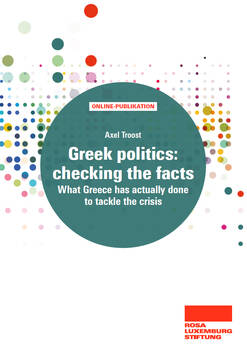
Following the parliamentary elections of October 2009, the newly elected Greek government under PrimeMinister George Papandreou put the budget deficit for 2009, in other words the new debt incurred in that year,at more than 12 % of the country’s GDP. This ‘political capitulation’ is regarded – at least in foreign eyes – as thestart of the Greek economic and financial crisis.
Whereas up to that point Greece had been regarded by the German public as an idyllic holiday destination,overnight it became a crisis-ridden country full of artful dodgers and creative accountants that attractedtorrents of derision, polemics and rancour from German politicians and media. The following article highlightssome of these alleged truths about ‘the Greeks’ that have been loudly proclaimed and are still persistently beingpeddled today. It then examines them objectively in order to establish how true they actually are.
As vice-chair of the Left and finance spokesman of its parliamentary group in the Bundestag, I establishedclose contacts with Greece following the emergence of SYRIZA – the Coalition of the Radical Left – andparticularly with the Greek government under Alexis Tsipras. In this context, I have repeatedly informed ourGreek comrades of the widespread views in Germany about ‘the Greeks’, and I have closely examined anycritique of ‘conditions in Greece’ that did not seem altogether implausible or that appeared to match my ownexperience. Needless to say, this scrutiny revealed that there is both light and shade in Greece. In so doing,however, I became keenly aware of the missionary zeal with which certain interested circles in German politics,in business and in the media, keep circulating tendentious portrayals, distorting facts and even slanderousstatements.
The intention of this paper is to counteract these fake news, without putting a gloss on anything, and to gatherfacts which must be presented all the more systematically in today’s allegedly post-truth era.
